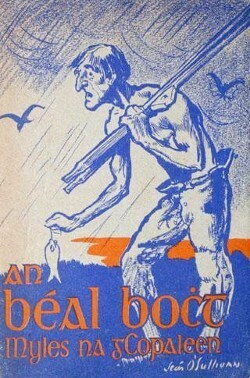
Brian Ó Conchubhair’s Irish language book about author Flann O’Brien has won two literary awards. And it’s not even on bookshelves yet.
Based on its advanced copy, the Notre Dame faculty member’s The Poor Life was named winner of the Best Nonfiction and Best Overall Prose awards at Oireachtas na Gaeilge, an annual Irish arts and culture festival.
“It won Best Overall Prose, which is not something I was expecting,” said Ó Conchubhair, an associate professor of Irish language and literature. “I mean, I wasn’t expecting either award, but that was a big surprise. A very pleasant surprise.”
O’Brien, who died in 1966, is one of the most important writers of the 20th century, Ó Conchubhair said. He, James Joyce, and Samuel Beckett are often referred to as the holy trinity of modern Irish literature.
“I want to reconfigure how people view him and the tragedy that was his life. To understand Flann is to understand the social history of Ireland — from the famine to the 1960s — through tracing one family.”
But just two biographies have been penned about O’Brien, whereas dozens have been written about Joyce and Beckett. And the last one about O’Brien, a satirist who wrote in both Irish and English, was published more than 30 years ago.
Since then, more of O’Brien’s archives have been unearthed and his satirical column “Cruiskeen Lawn” (the full little jug) that ran for 26 years in the Irish Times newspaper has been digitized. Since O’Brien’s work has undergone a re-evaluation, Ó Conchubhair thought it was time for another in-depth look at his life.
“People are beginning to look at his weekly column as a creative work spanning 3.5 million words. They’re looking at that as his masterpiece,” said Ó Conchubhair, a fellow of the Keough-Naughton Institute for Irish Studies, Nanovic Institute for European Studies, and Kellogg Institute for International Studies. “It was the first thing that people read in the morning during World War II. Politicians, civil servants, administrators were terrified of what Flann would say.”

O’Brien is still popular in Dublin.
“When you think of Flann, you think of all the pubs in Dublin. He still has a presence. He’s still accessible to Dubliners,” he said. “They’ve read Flann. They have stories about Flann.”
Millions outside of Dublin learned about O’Brien in 2006 due to a character on the Emmy Award-winning television show Lost reading his dark comedic novel The Third Policeman.
Ó Conchubhair said researching and writing his book was, at times, difficult: O’Brien — who was born Brian Ó Nuallain — was a prankster who used multiple pseudonyms as a writer.
“He laid so many false trails, he had so many personas,” Ó Conchubhair said. “When someone came to interview him, Flann would spin a yarn that he was born in Russia, that he was a professor at Trinity, all this type of stuff. That’s part of the challenge and the frustration of trying to track Flann down.”
O’Brien’s father died at a young age and O’Brien helped support his mother and 11 siblings. While his 1939 novel At Swim-Two-Birds was well received, most copies of the book were destroyed when Germans bombed a warehouse in London. His next English novel, The Third Policeman, was initially rejected for being too fantastical.
O’Brien, who was fired from his civil service job for mocking his boss, died of a heart attack in 1966. A year later, The Third Policeman was ultimately published to great acclaim.
Ó Conchubhair opted for The Poor Life as a title because of its similarity to the title of O’Brien’s novel The Poor Mouth, and it serves as an apt description of O’Brien’s life.
“It's a very, very sad story,” he said. “He gets a break right after he dies.”
The Poor Life is slated to launch April 1 — the 56th anniversary of O’Brien’s death — at The Palace Bar in Dublin.
Ó Conchubhair has written extensively, including an award-winning monograph on the intellectual history of the Irish Revival, Fin de Siècle na Gaeilge: Darwin, An Athbheochan agus Smaointeoireacht na hEorpa (The Irish Fin de Siècle: Darwin, the Revival and European Thought).
He is now penning a shorter version of The Poor Life in English for an international audience.
“I want to reconfigure how people view him and the tragedy that was his life,” said Ó Conchubhair. “To understand Flann is to understand the social history of Ireland — from the famine to the 1960s — through tracing one family.”
Originally published by at al.nd.edu on February 23, 2023. Minor edits by Julian Dean on March 9, 2023